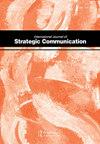Strategic Communication and Political Ideologies in South America. COVID-19 Crisis Management in the Cases of the Populist Governments of Argentina and Brazil
IF 1.9
Q1 COMMUNICATION
International Journal of Strategic Communication
Pub Date : 2022-05-27
DOI:10.1080/1553118X.2022.2056040
引用次数: 3
Abstract
ABSTRACT With regard to strategic communication, there is a set of additive factors driving the strategic complexity that determines the magnitude of an issue and the path to follow. During the COVID-19 pandemic, different governments worldwide have played a variety of roles and their impact has been conclusive. In Latin America, current political and ideological antagonism has configured a diversity of contexts and scenarios that have conditioned public communication management, setting out from the assumption that they have variously weighted the different driving factors of the strategic complexity. Within the framework of the EUPRERA COM-COVID network, we present the cases of strategic communication management of the national governments of Brazil and Argentina during the second half of 2020 and their impact on the population from the sanitary, social and economic levels. Of 1,332 demographically weighted cases, we analyze the information channels, credible sources, types of messages and their effectiveness comparatively. The most relevant conclusion lies in confirming that the strategic factor model in the public sector is conditioned by the ideological profile of who governs and this determines the decisions and effectiveness of the management.南美洲的战略传播与政治意识形态。新冠肺炎危机管理——以阿根廷和巴西民粹主义政府为例
摘要就战略沟通而言,有一系列附加因素驱动着战略复杂性,这些因素决定了问题的严重性和应遵循的路径。在新冠肺炎大流行期间,世界各地的不同政府发挥了各种作用,其影响是决定性的。在拉丁美洲,当前的政治和意识形态对立构成了制约公共传播管理的各种背景和情景,假设它们对战略复杂性的不同驱动因素进行了不同的加权。在欧盟预委会COM-COVID网络的框架内,我们介绍了2020年下半年巴西和阿根廷国家政府的战略沟通管理案例,以及它们从卫生、社会和经济层面对人口的影响。在1332例人口统计学加权病例中,我们比较分析了信息渠道、可信来源、信息类型及其有效性。最相关的结论是,公共部门的战略因素模型受到谁执政的意识形态特征的制约,这决定了管理层的决策和有效性。
本文章由计算机程序翻译,如有差异,请以英文原文为准。
求助全文
约1分钟内获得全文
求助全文
来源期刊

International Journal of Strategic Communication
Social Sciences-Sociology and Political Science
CiteScore
3.40
自引率
0.00%
发文量
39
期刊介绍:
The International Journal of Strategic Communication examines the philosophical, theoretical, and applied nature of strategic communication, which is “the purposeful use of communication by an organization to fulfill its mission.” IJSC provides a foundation for the study of strategic communication from diverse disciplines, including corporate and managerial communication, organizational communication, public relations, marketing communication, advertising, political and health communication, social marketing, international relations, public diplomacy, and other specialized communication areas. The IJSC is the singular forum for multidisciplinary inquiry of this nature.
 求助内容:
求助内容: 应助结果提醒方式:
应助结果提醒方式:


